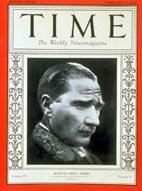
Mustafa Kemal Ataturk

Mustafa Kemal Ataturk, (1881-1938) was the founder and the first President of the Republic of Turkey. He was born in 1881 in Salonica (Selanik). He graduated from the Military High School there, and then in 1902, he began his military career at the Staff College in Istanbul as a staff officer. During his military term of office, he served in the Balkan War as a succesful commander (1912-1914), he further took part in the First World War (1914-1918); and afterwards carried out various succesful military operations. In the days following his landing in Samsun on May 19,1919, he convened the Erzurum and Sivas Congresses.
On April 23,1920, he opened the Turkish Grand National Assembly, and hence, rushed into a series of efforts to establish a new Turkish State, the center of which was to be Ankara. The Turkish forces under the military leadership of Ataturk carried out the "War of Independence" against the occupying allied powers and in the end won victories on every front all over the country. On July 24,1923, with the signing of the Treaty of Lausanne, the independence of the new Turkish State was recognized by all the states.
Ataturk built up a new sturdy, vigorous state. On October 29,1923, he declared the new Turkish State a "republic". Following the declaration of the Republic, the caliphate was abolished. Ataturk, besides being a military genius, a charismatic leader, was also a comprehensive reformer. It was then essential for the Republic of Turkey to be westernized in order to progress towards the level of contemporary civilizations and to be an active member of culturally developed communities.
The new Turkish State founded in 1920 required a new legal system. Ataturk, adopted the Swiss Civil Code as a substitute for Canonical Law (theological religious law-Seriat Kanunu), and instead of the penal code then in force, he brought in the Italian Penal Code. Hence, the Turkish legal system was modernized with the contemporary requirements.
As a result of such a modification, secularism, one of the fundementals of Kemalism, signifying the complete seperation of government and religious affairs, was adopted. Until the beginning of the 19th century, several educational systems were in the Ottoman Empire. Ataturk observed that such systems dominant at Muslim theological schools did not meet the needs of the society. It was essential to establish a new educational system similar to the western models. Thus the existing system was changed. In 1933 a university reform was introduced.
One of the most significant reforms of Ataturk was the abolition of the use of the Arabic script and the adoption of the Latin script. In 1928 the new Turkish Alphabet was adopted. Many other reforms had been achieved other than those already mentioned. As an example: In 1924 the Weekend Act, in 1925 International Time and Calendar System, in 1926 Obligation Law and Commercial law, in 1933 System of Measures keeping with the western standards, and in 1934 the Surname Act--making it a requirement for all to have a last name.
As a result of the reforms, Turkey's economic structure was completely changed. With the annulment of capitulations, fundamentals needed to secure a national and liberal economy were achieved. Ataturk's view on the economy of the country lies in the saying,"The real master of the country, is the villager." Following the reform on the script, which was meant to be a kind of nationalism in the cultural field, Ataturk concentrated his attention on history. He established the Turkish Historical Society in 1931. Here, Turkey's historical past was thoroughly examined and evaluated.
With the reforms of Ataturk, Turkish women, who for centuries had been second class citizens, were given increased rights which they had used to had in old old Turkish family structure back in Turks were justs nomads. Thus, with the civil code passed, Turkish women would enjoy equal rights with those of the men, could be appointed to official posts, would enjoy the right to vote and to be elected to the parliament. The monogamy principle and equal rights for women changed the spirit of the society.
With the reform on dress, women stopped wearing the veils and "carsaf", and men started to wear western style hats rather than the "fez". The fez hat was actually banned by law, and still today, no one is allowed to wear them. It was said that the red hat was a symbol of the old caliphate, and they didn't want to remember it.
Ataturk's foreing policy is based on, as he himself had underlined," Peace at home, Peace in the world". Ataturk had introduced the reforms in the spirit of the following principles: Awareness of the national historical past, love of the country and its people, the concept of a national language, love of independence and liberty, the complete unconditional sovereignty of the nation,aspiration towards going beyond the level of contemporary civilizations, will to develop the national culture,the idea of trust in the Turkish people, faith in unity and interdependence, the principle of the separation of the army, educational institutions and religion from politics.
Ataturk died in 1938, but attained immortality in the eyes of his people. As a commander had been the victor of many battles, as a leader had influenced the masses, as a statesman had given the example of a succesful administration and as a revolutionary had striven to alter the social, cultural, economic, political, and legal structure of the society as its roots.he was one of the most eminent personalities in the history of the world.